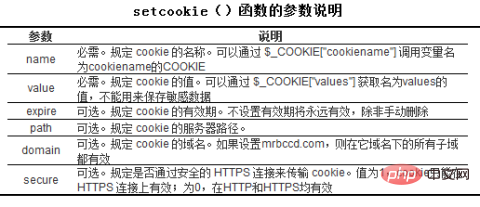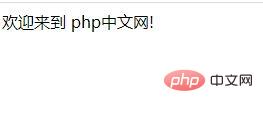What are PHP cookies? How to create? How to delete it?
The previous article introduced you to "Those "things" about PHP files! ! ! 》, this article continues to introduce to you what is PHP Cookie? How to create? How to delete it?
Hope it’s helpful to you!

What are Cookies?
Cookies are often used to identify users. A cookie is a small file that a server leaves on a user's computer. Each time the same computer requests a page through the browser, the cookie will be sent to the computer. With PHP, users can create and retrieve cookie values.
How to create a cookie?
setcookie() function is used to set cookies.
Note: setcookie() function must be located before the tag.
Syntax:
setcookie(name, value, expire, path, domain);
PHPsetcookie() parameter details:
As shown in the figure:

Regarding the creation of cookies, we use code to show it specifically:
Example 1:
First create a cookie named "user" and then assign a value "PHP" and also specifies that this cookie will expire in one hour.
The code is as follows:
<?php
setcookie("user","php",time()+3600);
//在发送 cookie 时,cookie 的值会自动进行 URL 编码,在取回时进行自动解码。
//为防止 URL 编码,请使用 setrawcookie() 取而代之。
?>
方法二:用户还可以通过另一种方式设置cookie的过期时间,代码如下:
<?php
//示例1
//setcookie("user","php",time()+3600);
//在发送 cookie 时,cookie 的值会自动进行 URL 编码,在取回时进行自动解码。
//为防止 URL 编码,请使用 setrawcookie() 取而代之。
//示例2
$expire=time()+60*60*24*30;
setcookie("user", "php", $expire);
//过期时间被设置为一个月(60 秒 * 60 分 * 24 小时 * 30 天)。
?>
<html>
.....How to retrieve the value of Cookie?
PHP’s $_COOKIE variable is used to retrieve the value of the cookie. The code is as follows:
<?php // 输出 cookie 值 echo $_COOKIE["user"]; // 查看所有 cookie print_r($_COOKIE); ?>
The running results are as follows:

Use the isset() function to confirm whether the cookie has been set:
Additional information about the usage of isset 0 function:
PHP’s isset() function - generally used to detect whether a variable is set
Format:
boolisset( mixed var [, mixed var[,...11 )
Function: Check whether the variable is set
Return value:
If the variable does not exist Then return FALSE
If the variable exists and its value is NULL, also return FALSE
- ##If the variable exists and its value If it is not NULL, TRUB will be returned. When multiple variables are checked at the same time, TRUB will be returned only when each single item meets the previous requirement. Otherwise, the result will be FALSE
The specific code is as follows:
<html> <head> <meta charset="utf-8"> <title>php中文网(php.cn)</title> </head> <body> <?php if (isset($_COOKIE["user"])) echo "欢迎来到 " . $_COOKIE["user"] . "!<br>"; else echo "普通访客!<br>"; ?> </body> </html>
The running results are as follows:
How to delete cookies?
 When deleting a cookie, you should change the expiration date to a point in time in the past.
When deleting a cookie, you should change the expiration date to a point in time in the past.
The code is as follows: Recommended learning: "PHP Video Tutorial The above is the detailed content of What are PHP cookies? How to create? How to delete it?. For more information, please follow other related articles on the PHP Chinese website!<?php
// 设置 cookie 过期时间为过去 1 小时
setcookie("user", "", time()-3600);
?>
"

Hot AI Tools

Undresser.AI Undress
AI-powered app for creating realistic nude photos

AI Clothes Remover
Online AI tool for removing clothes from photos.

Undress AI Tool
Undress images for free

Clothoff.io
AI clothes remover

AI Hentai Generator
Generate AI Hentai for free.

Hot Article

Hot Tools

Notepad++7.3.1
Easy-to-use and free code editor

SublimeText3 Chinese version
Chinese version, very easy to use

Zend Studio 13.0.1
Powerful PHP integrated development environment

Dreamweaver CS6
Visual web development tools

SublimeText3 Mac version
God-level code editing software (SublimeText3)

Hot Topics
 1378
1378
 52
52
 PHP 8.4 Installation and Upgrade guide for Ubuntu and Debian
Dec 24, 2024 pm 04:42 PM
PHP 8.4 Installation and Upgrade guide for Ubuntu and Debian
Dec 24, 2024 pm 04:42 PM
PHP 8.4 brings several new features, security improvements, and performance improvements with healthy amounts of feature deprecations and removals. This guide explains how to install PHP 8.4 or upgrade to PHP 8.4 on Ubuntu, Debian, or their derivati
 How To Set Up Visual Studio Code (VS Code) for PHP Development
Dec 20, 2024 am 11:31 AM
How To Set Up Visual Studio Code (VS Code) for PHP Development
Dec 20, 2024 am 11:31 AM
Visual Studio Code, also known as VS Code, is a free source code editor — or integrated development environment (IDE) — available for all major operating systems. With a large collection of extensions for many programming languages, VS Code can be c
 How do you parse and process HTML/XML in PHP?
Feb 07, 2025 am 11:57 AM
How do you parse and process HTML/XML in PHP?
Feb 07, 2025 am 11:57 AM
This tutorial demonstrates how to efficiently process XML documents using PHP. XML (eXtensible Markup Language) is a versatile text-based markup language designed for both human readability and machine parsing. It's commonly used for data storage an
 CakePHP Quick Guide
Sep 10, 2024 pm 05:27 PM
CakePHP Quick Guide
Sep 10, 2024 pm 05:27 PM
CakePHP is an open source MVC framework. It makes developing, deploying and maintaining applications much easier. CakePHP has a number of libraries to reduce the overload of most common tasks.
 PHP Program to Count Vowels in a String
Feb 07, 2025 pm 12:12 PM
PHP Program to Count Vowels in a String
Feb 07, 2025 pm 12:12 PM
A string is a sequence of characters, including letters, numbers, and symbols. This tutorial will learn how to calculate the number of vowels in a given string in PHP using different methods. The vowels in English are a, e, i, o, u, and they can be uppercase or lowercase. What is a vowel? Vowels are alphabetic characters that represent a specific pronunciation. There are five vowels in English, including uppercase and lowercase: a, e, i, o, u Example 1 Input: String = "Tutorialspoint" Output: 6 explain The vowels in the string "Tutorialspoint" are u, o, i, a, o, i. There are 6 yuan in total
 Explain JSON Web Tokens (JWT) and their use case in PHP APIs.
Apr 05, 2025 am 12:04 AM
Explain JSON Web Tokens (JWT) and their use case in PHP APIs.
Apr 05, 2025 am 12:04 AM
JWT is an open standard based on JSON, used to securely transmit information between parties, mainly for identity authentication and information exchange. 1. JWT consists of three parts: Header, Payload and Signature. 2. The working principle of JWT includes three steps: generating JWT, verifying JWT and parsing Payload. 3. When using JWT for authentication in PHP, JWT can be generated and verified, and user role and permission information can be included in advanced usage. 4. Common errors include signature verification failure, token expiration, and payload oversized. Debugging skills include using debugging tools and logging. 5. Performance optimization and best practices include using appropriate signature algorithms, setting validity periods reasonably,
 7 PHP Functions I Regret I Didn't Know Before
Nov 13, 2024 am 09:42 AM
7 PHP Functions I Regret I Didn't Know Before
Nov 13, 2024 am 09:42 AM
If you are an experienced PHP developer, you might have the feeling that you’ve been there and done that already.You have developed a significant number of applications, debugged millions of lines of code, and tweaked a bunch of scripts to achieve op
 Explain late static binding in PHP (static::).
Apr 03, 2025 am 12:04 AM
Explain late static binding in PHP (static::).
Apr 03, 2025 am 12:04 AM
Static binding (static::) implements late static binding (LSB) in PHP, allowing calling classes to be referenced in static contexts rather than defining classes. 1) The parsing process is performed at runtime, 2) Look up the call class in the inheritance relationship, 3) It may bring performance overhead.




